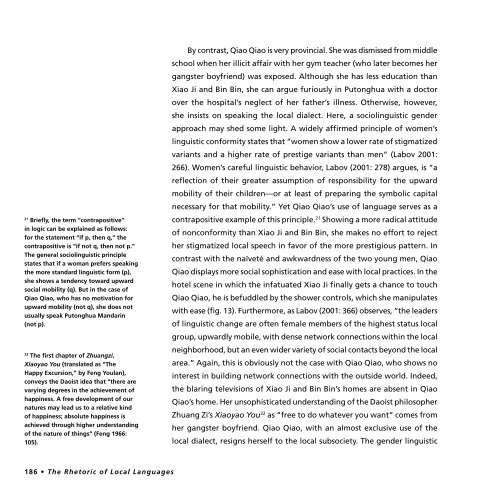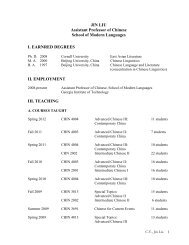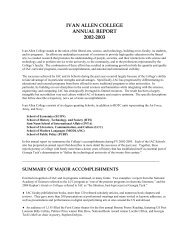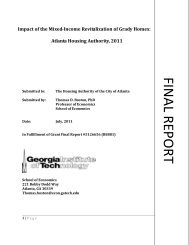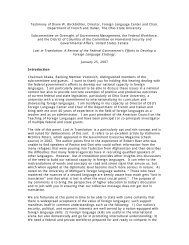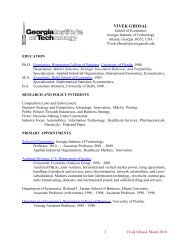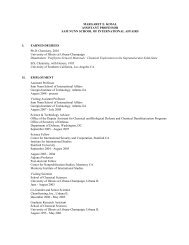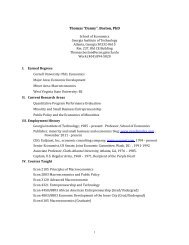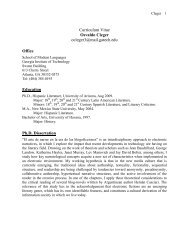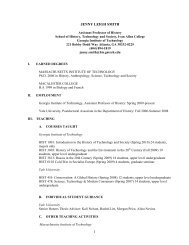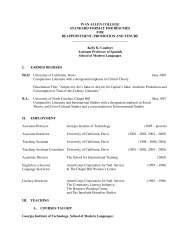Read this paper
Read this paper
Read this paper
You also want an ePaper? Increase the reach of your titles
YUMPU automatically turns print PDFs into web optimized ePapers that Google loves.
21<br />
Briefly, the term “contrapositive”<br />
in logic can be explained as follows:<br />
for the statement “if p, then q,” the<br />
contrapositive is “if not q, then not p.”<br />
The general sociolinguistic principle<br />
states that if a woman prefers speaking<br />
the more standard linguistic form (p),<br />
she shows a tendency toward upward<br />
social mobility (q). But in the case of<br />
Qiao Qiao, who has no motivation for<br />
upward mobility (not q), she does not<br />
usually speak Putonghua Mandarin<br />
(not p).<br />
22<br />
The first chapter of Zhuangzi,<br />
Xiaoyao You (translated as “The<br />
Happy Excursion,” by Feng Youlan),<br />
conveys the Daoist idea that “there are<br />
varying degrees in the achievement of<br />
happiness. A free development of our<br />
natures may lead us to a relative kind<br />
of happiness; absolute happiness is<br />
achieved through higher understanding<br />
of the nature of things” (Feng 1966:<br />
105).<br />
By contrast, Qiao Qiao is very provincial. She was dismissed from middle<br />
school when her illicit affair with her gym teacher (who later becomes her<br />
gangster boyfriend) was exposed. Although she has less education than<br />
Xiao Ji and Bin Bin, she can argue furiously in Putonghua with a doctor<br />
over the hospital’s neglect of her father’s illness. Otherwise, however,<br />
she insists on speaking the local dialect. Here, a sociolinguistic gender<br />
approach may shed some light. A widely affirmed principle of women’s<br />
linguistic conformity states that “women show a lower rate of stigmatized<br />
variants and a higher rate of prestige variants than men” (Labov 2001:<br />
266). Women’s careful linguistic behavior, Labov (2001: 278) argues, is “a<br />
reflection of their greater assumption of responsibility for the upward<br />
mobility of their children—or at least of preparing the symbolic capital<br />
necessary for that mobility.” Yet Qiao Qiao’s use of language serves as a<br />
contrapositive example of <strong>this</strong> principle. 21 Showing a more radical attitude<br />
of nonconformity than Xiao Ji and Bin Bin, she makes no effort to reject<br />
her stigmatized local speech in favor of the more prestigious pattern. In<br />
contrast with the naïveté and awkwardness of the two young men, Qiao<br />
Qiao displays more social sophistication and ease with local practices. In the<br />
hotel scene in which the infatuated Xiao Ji finally gets a chance to touch<br />
Qiao Qiao, he is befuddled by the shower controls, which she manipulates<br />
with ease (fig. 13). Furthermore, as Labov (2001: 366) observes, “the leaders<br />
of linguistic change are often female members of the highest status local<br />
group, upwardly mobile, with dense network connections within the local<br />
neighborhood, but an even wider variety of social contacts beyond the local<br />
area.” Again, <strong>this</strong> is obviously not the case with Qiao Qiao, who shows no<br />
interest in building network connections with the outside world. Indeed,<br />
the blaring televisions of Xiao Ji and Bin Bin’s homes are absent in Qiao<br />
Qiao’s home. Her unsophisticated understanding of the Daoist philosopher<br />
Zhuang Zi’s Xiaoyao You 22 as “free to do whatever you want” comes from<br />
her gangster boyfriend. Qiao Qiao, with an almost exclusive use of the<br />
local dialect, resigns herself to the local subsociety. The gender linguistic<br />
186 • The Rhetoric of Local Languages<br />
MCLC 18.2.indd 186<br />
12/20/06 2:01:38 PM


